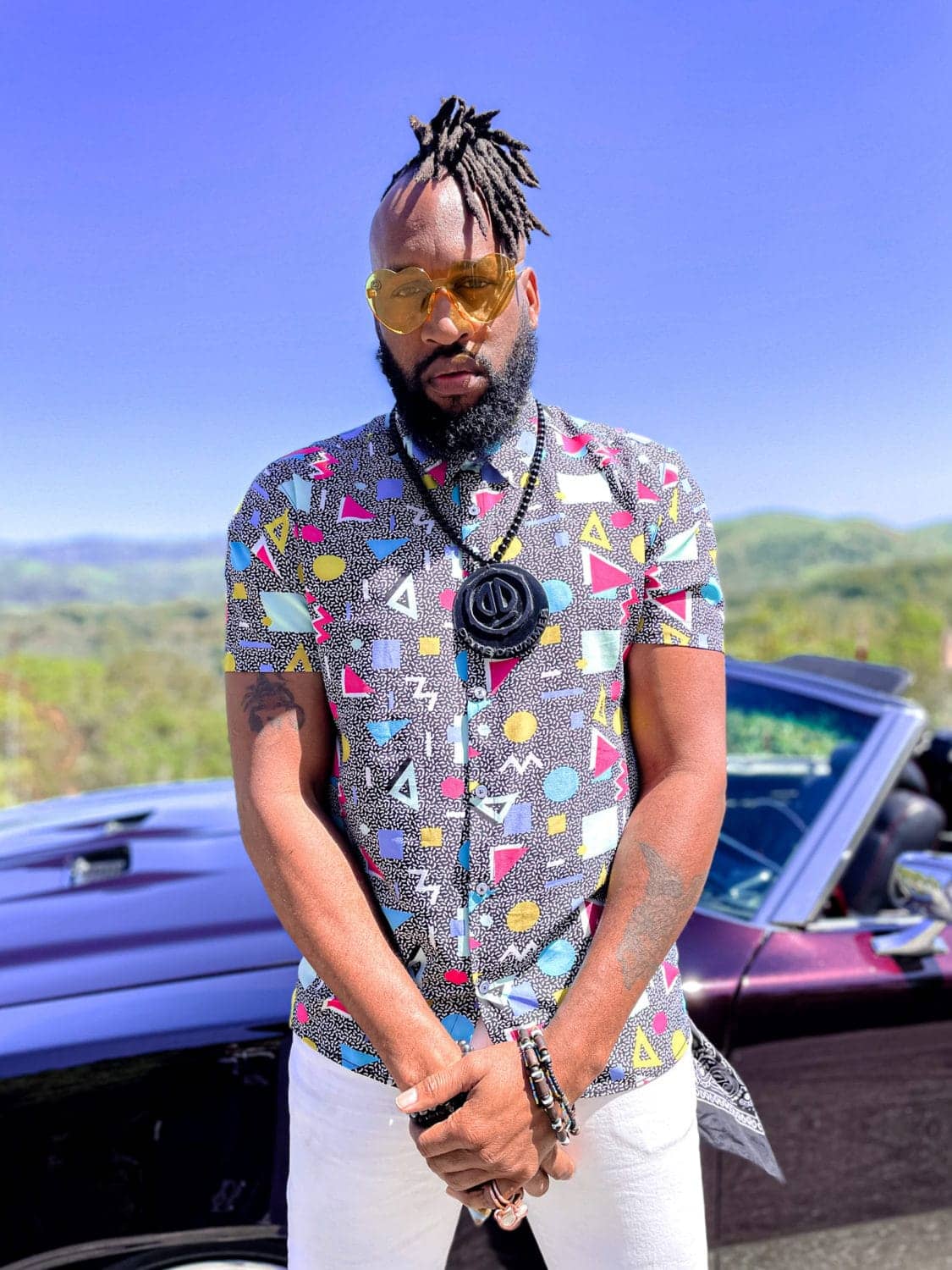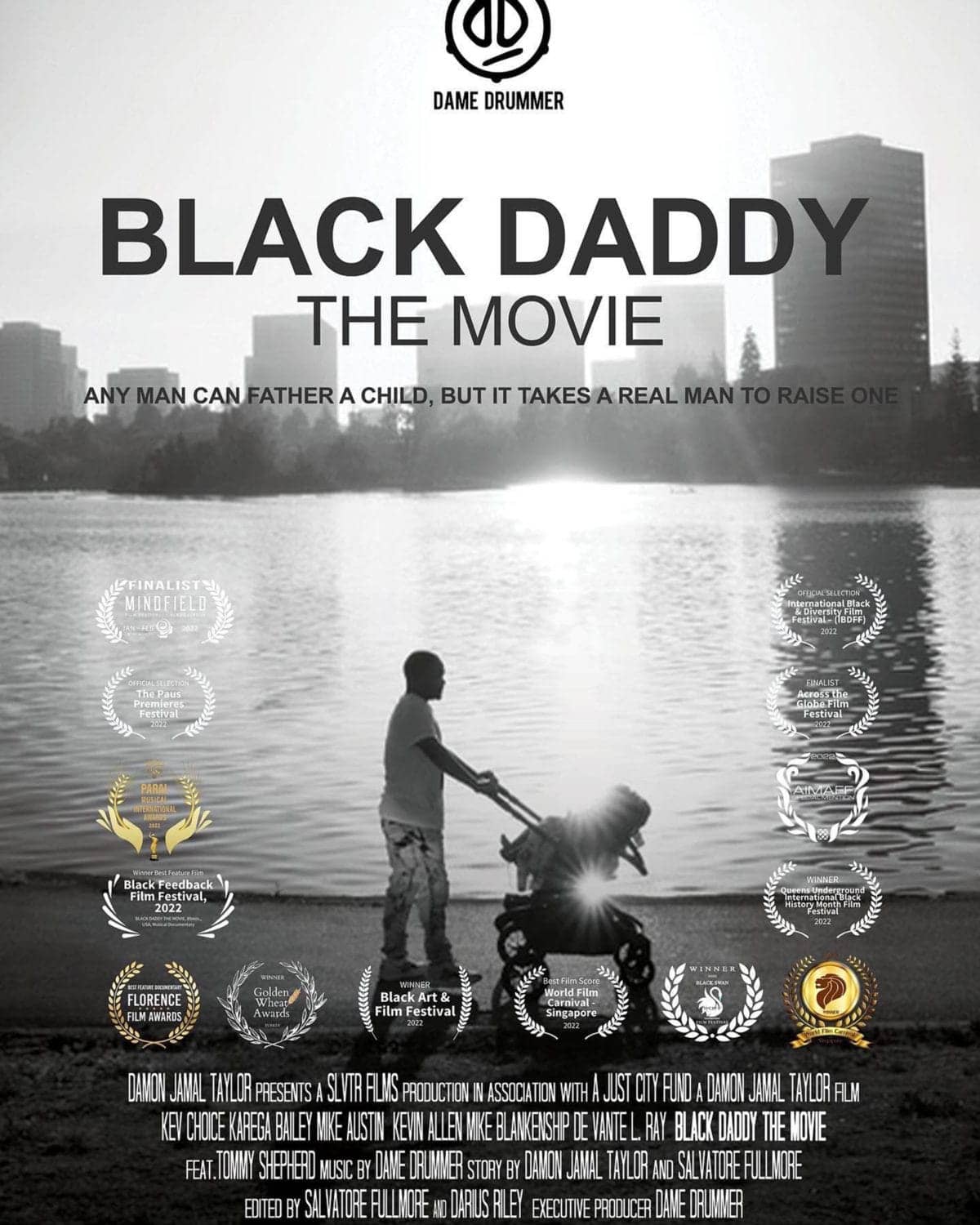
by People’s Minister of Information JR Valrey, SF Bay View Oakland Bureau
The annual San Francisco Black Film Festival is coming, from June 16 to 19, and one of the more interesting films that is selected to screen in-person, since some of the festival is virtual-only, is “Black Daddy: The Movie” by filmmaker and musician Dame Drummer. It is a well thought out experimental film that is part documentary, part music video and part Black men support group. The subject, Black fatherhood, is seldom talked about in a constructive way in mainstream culture, due to the fact that mainstream culture is in line with the government’s well documented agenda to destroy the Black family.
“Black Daddy: The Movie” is a beautiful conversation piece that can lead spouses and families to discuss topics covered in the film that are relevant to their existence, prosperity and happiness. “Black Daddy” looks at many complex issues that Black men face while playing their roles in the modern day family and living in this country.
Check out filmmaker Dame Drummer in his own words. Also, come see “Black Daddy: The Movie” at the San Francisco Black Film Festival; it screens Sunday, June 19, on the last day of the festival, on Father’s Day.
JR Valrey: What inspired you to do a movie about Black Fatherhood? And what inspired you to tell the story from the perspective of you being a father and a son?
Dame Drummer: First, thanks for doing this interview, man. I really appreciate it when anyone wants to talk about this film.
I was ready to see something different on screen when it comes to Black men. We often see ourselves on screen as athletes, as a comedic relief, or in a violent or action packed depiction. If we see ourselves on screen, then surely our women, children and other communities become aligned with that same narrative.
I have very different experiences when it comes to the men I know. They are intelligent cognitively as well as emotionally. We lean on each other in real life, which I think is the most important piece, for what can be considered “voiceless” Black men. I was inspired to tell these stories because I have often felt voiceless and came to learn that a lot of other men have felt this way in some way, shape or form as well. I am passionate when it comes to storytelling, so when I had the idea of telling stories of some of the men that I know, I took it and ran with it.
JR Valrey: How did you pick the fathers that you interviewed for the film? What types of Black fatherhood do you feel they represent?
Dame Drummer: As an artist I am in close proximity with other artists, who in my opinion, happen to be great dads. There is a bond that we have that supersedes the art that we create. We do things together outside of music, which makes it meaningful. When the music stops, we still have responsibilities to the lives we helped to create.
As far as the type of “Black fatherhood” they represent, I feel like any Black man raising a child in America knows what he’s up against. We framed almost the entire movie from one question: What does it mean to be a Black father in America? When we opened the dialogue around this question, we learned that we all represent Black fatherhood and, well, I don’t think there is a type. I believe that if you are a Black man raising children, then you do whatever it is you need to do to make sure your child knows love.
JR Valrey: Are there other depictions of Black fatherhood that you would have liked to present but didn’t in this film for whatever reason? Please explain?
When the music stops, we still have responsibilities to the lives we helped to create.
Dame Drummer: Of course, but I think I did a great job with the men who responded to the call though. Obviously the stories don’t stop with my film. There are so many stories yet to be told by Black men from a plethora of backgrounds and experiences. I’m creating a curriculum to continue the conversation across communities, and I’m definitely gonna keep the cameras rolling as it happens.
JR Valrey: What do you want the audience to take away from “Black Daddy” after watching it? What would you like your film to add to the discussion?
Dame Drummer: What I want the audience to take away is that it is possible for Black men to love and support each other in a way that is beneficial to our healing and to our community. I want the people to see that we are very human and that we value the very simple things in life like: being present, being able to provide, teach and nurture relationships with our children and other men and women in the Black community. I know that part of the discussion needs to include how we build and maintain strong Black families and relationships with our children and the circles that they intersect with.
JR Valrey: Why are most of the fathers that you depicted in the film musicians? What point are you making by depicting mostly musicians?
Dame Drummer: Those are the men that I spend a lot of time around. I’ve spent a lot of time building relationships with these people, because we share some of the same obstacles as it pertains to fatherhood. We all want good things for our children and our communities as a whole. They just so happen to be dope musicians as well. There is no point I’m trying to make, but I will say that I’m a musician and I don’t recall a time where we’ve seen musicians sit down and talk about being fathers or their experiences. We talk to about 16 men in the film, and about seven are musicians. Music is a huge part of my life, so the film reflects the deep connection I have with the art.
JR Valrey: You say Oakland a number of times in this film. What makes this a genuine Oakland story?
Dame Drummer: I mention Oakland because that’s where I live. This is my home. My son’s friends live here. My daughter was born here. I’ve built a lot of community here and a number of my professional relationships. There are people who contribute to Oakland in a number of ways represented in this film who definitely have their own unique connections to The Town. Oakland is home to a resilient spirit, and I think this film represents that.

It’s been received very well. In the lobby after the film has been shown have been some of the greatest moments for me. I was actually surprised at how women received the film. They found themselves in the film and found answers to questions that had previously gone unanswered. Some have also gained a new perspective of what’s really on some of the brothers’ minds.
I’ve won over 10 awards so far – seven for Best Documentary, two for Best Film Score, one for Best Debut Film Maker and Best Feature Film at Black Feedback Festival in Los Angeles, Queens Underground Film Festival in Queens New York, and Tampa Bay Black Art & Film Festival to name a few.
JR Valrey: Can you talk a little bit about your creative process with this film? From the credits, it looks as if you were involved in every part of bringing this film to the screen; is that true?
Dame Drummer: I can’t help but to be directly connected to every piece of art that I produce. It may seem vain to see my name so much, but it’s not. I actually put the work in, and earned every credit. Once I have a vision, I usually get it all at once. I’m connected musically to every single aspect of the movie, because I think and process everything in life musically, so I have to make sure that whatever you see on the screen matches the feeling I felt when I conceptualized it or saw the footage for the first time.
In the credits, I am heavily credited in the film, and yes I was involved in every part of the process, but other key players on the production side include Salvatore Fullmore, Darius Riley and Leilani Amolo, and without them this film doesn’t get made!
JR Valrey: After the film festival circuit, what are your plans for “Black Daddy”?
Dame Drummer: I plan to direct a visual performance piece that includes a curriculum so that we can take “Black Daddy: The Movie” on the road to schools, universities, prisons and any place where Black men and Black fathers are ready to have the conversation and contribute to our own healing and our communities.
Nobody is coming to our aid but us, so we have much work to do. This is not a film just to say I made a film.This is a call to action. We’re about to get busy.
JR Valrey: Can you also talk about how you will continue the “Black Daddy” discussion on your website, after the screenings?
Dame Drummer: Because we had so much footage, we are going to create options to hear more from some of the men featured on the film. We have hours and hours of footage, but we cut it to 85 minutes on screen; so we want to give the people an opportunity to go back and go a little deeper and connect with the people that they resonated with as they watched the film.
People can follow me on all platforms @DameDrummer and follow @BlackDaddyTheMovie on IG and Facebook and @BlackDaddyMovie on Twitter.





